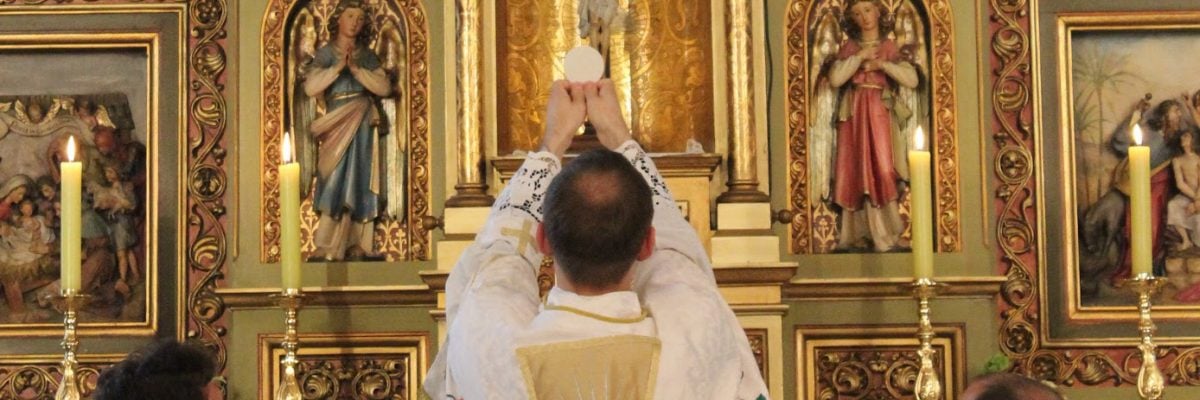
Homily for the Second Sunday in Ordinary Time
Grant us, O Lord, we pray, that we may participate worthily in these mysteries, for whenever the memorial of this sacrifice is celebrated the work of our redemption is accomplished.
— Prayer over the Gifts for the Second Sunday in Ordinary Time
What is a priest’s principal job? Most of us would say it is taking care of people—of their spiritual needs for counsel and instruction.
Well, yes, there is a great deal of truth in this idea, but it would be better to say that these things, though they are a priest’s first duty, are not his most important or most lofty.
The priest’s first duty is to preach the Faith by word and example. That is clear in the language of the Second Vatican Council, when it calls preaching the “primary duty” of the priest (Presbyterorum Ordinis 4). But his chief and most valuable role, according to the same council, is to celebrate the sacrifice of the Eucharist.
This role is so valuable that the Church strongly encourages priests to celebrate every day even when the faithful cannot be present. Why is this? It might seem strange for a priest to celebrate Mass without any of the faithful present, but the Church says his daily celebration is a “just and reasonable cause” when he cannot have a congregation.
The prayer over the gifts for today’s Mass gives us the reason from the deepest level of our faith. This prayer has been so influential in expressing this reason for daily celebration that it has even entered into the Church’s canon law. It is very rare for a liturgical text to be quoted in a legal norm, even in the Church’s laws, but today’s prayer is quoted both in the decrees of Vatican II and in the Code of Canon Law.
Here’s the canon:
Remembering always that in the mystery of the eucharistic sacrifice the work of redemption is exercised continually, priests are to celebrate frequently; indeed, daily celebration is recommended earnestly since, even if the faithful cannot be present, it is the act of Christ and the Church in which priests fulfill their principal function (904).
And here’s the text from Vatican II:
Priests act especially in the person of Christ as ministers of holy things, particularly in the Sacrifice of the Mass, the sacrifice of Christ who gave himself for the sanctification of men. Hence, they are asked to take example from that with which they deal, and inasmuch as they celebrate the mystery of the Lord’s death they should keep their bodies free of wantonness and lusts. In the mystery of the eucharistic sacrifice, in which priests fulfill their greatest task, the work of our redemption is being constantly carried on; and hence the daily celebration of Mass is strongly urged, since even if there cannot be present a number of the faithful, it is still an act of Christ and of the Church. Thus when priests join in the act of Christ the Priest, they offer themselves entirely to God, and when they are nourished with the body of Christ they profoundly share in the love of him who gives himself as food to the faithful (Presbyterorum Ordinis 12-15).
We will understand the deep mystical and sacramental meaning of the prayer over the gifts of this Sunday’s Mass if we consider this truth: the Mass is not simply a way of producing the Real Presence of Christ’s body and blood for the uses of Holy Communion or adoration. The Mass brings about rather the Real Presence under the separate appearances of bread and wine so that the body and blood of the Lord may be offered up in sacrifice, the very same sacrifice as the sacrifice of the Lord on Calvary.
The Savior through his priesthood shared by our ministers offers up his perfect and completed sacrifice in the Eucharist so as to apply its fruits throughout time, “until he comes in glory.” The sacrament of the Eucharist is essentially and principally a sacrifice, and from this sacrifice the Church draws all her life and worship, all her grace and perfection. Holy Communion is a sharing in this sacrifice, as is adoration.
Even Luther upheld the substantial and real presence of Christ’s body and blood, and held that the sacrament could be adored during the Communion service, but for Catholics the Blessed Sacrament is even more: it is a true offering of the selfsame perfect sacrifice of the Cross. Our Catholic faith tells us that most of all the Eucharist is an act of worship and offering to God, and that our communion is a fruit of this worship, but it is not its most essential aspect. That is why the priest’s Mass has infinite value for the good of the Church, even if no one can be present or no one receives Holy Communion. Blessed Paul VI and St. John Paul II both repeated this teaching strongly and more than once.
Two helpful things would happen if priests and people took this teaching to heart. First of all, priests would strive never to omit celebrating or concelebrating Mass each day since this is by far, infinitely far, the greatest thing they can do for the Church. Second, the faithful would realize that the main point of their participation is to offer the sacrifice that Our Lord offered on Calvary. They are not only receiving from the offering, they are sharing in the act of offering itself as Christ’s priestly people. This would also show that when we are unable to receive Holy Communion because there is some moral or physical obstacle to our doing so, we still share in the sacrament, because this sacrament is first of all a sacrifice and only then a communion.
The mystical and mysterious identity of the Christian people—priests and faithful together, with the Savior’s worship—is the most precious quality of our life here below. Our Lord himself said “and if I be lifted up from the earth I will draw all things to myself.” Throughout the ages, and in each daily Holy Mass, Jesus is drawing all things to himself by the hands of his priests who lift him up in sacrifice.



